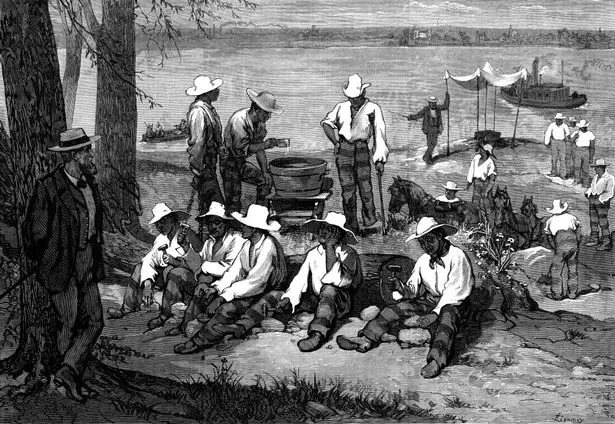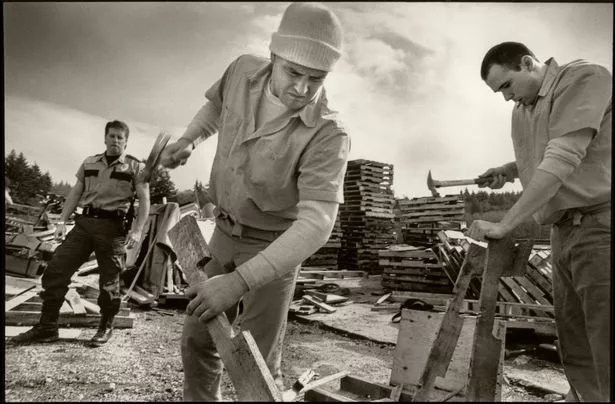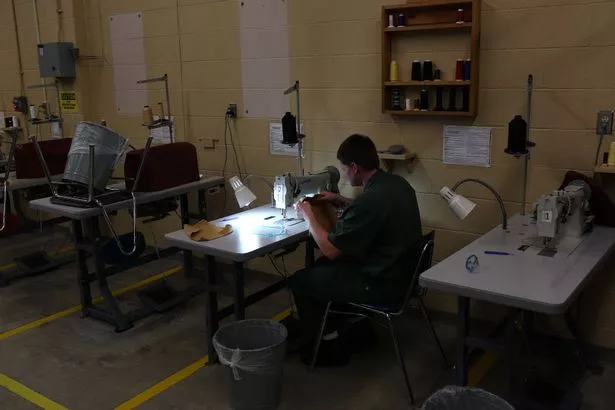Forced labour chains made up of US prisoners who are subjected to physical abuse and threatened, produce countless American goods from household brands.
Louisiana State Penitentiary, the country’s largest maximum-security prison, previously a southern slave plantation, sees truck loads of prisoners sentenced to hard labor and forced to work, for pennies an hour or sometimes nothing at all.
The troops of forced laborers were followed by the Associated Press another 600 miles to a Texas base that feeds into the supply chains of giants like McDonald’s, Walmart and Cargill.
Countless webs of forced laborers link some of the world’s largest food companies and most popular brands to jobs performed by U.S. prisoners nationwide, according to a sweeping two-year AP investigation into prison labor that tied hundreds of millions of dollars’ worth of agricultural products to goods sold on the open market. Frosted Flakes cereal, Ball Park hot dogs, Gold Medal flour, Coca-Cola and Riceland rice are blocked from some countries who do not allow the sale of goods made by using forced or prison labor.
If prisoners refuse to work, some can jeopardize their chances of parole or face punishment like being sent to solitary confinement. They also are often excluded from protections guaranteed to almost all other full-time workers, even when they are seriously injured or killed on the job.
Read More: Inside horror Jordan drone attack that killed 3 US troops in ‘very deliberate escalation’

(
Getty Images)
Many of the companies buying directly from prisons are violating their own policies against the use of such labor. But it’s completely legal, dating back largely to the need for labor to help rebuild the South’s shattered economy after the Civil War. Enshrined in the Constitution by the 13th Amendment, slavery and involuntary servitude are banned – except as punishment for a crime.
One man, Willie Ingram picked cotton and okra during his 51 years in the state penitentiary, better known as Angola. During his time in the fields, he was overseen by armed guards on horseback and recalled seeing men, working with little or no water, passing out in triple-digit heat. Some days, he said, workers would throw their tools in the air to protest, despite knowing the potential consequences.
“They’d come, maybe four in the truck, shields over their face, billy clubs, and they’d beat you right there in the field. They beat you, handcuff you and beat you again,” said Ingram, who received a life sentence after pleading guilty to a crime he said he didn’t commit. He was told he would serve 10 and a half years and avoid a possible death penalty, but it wasn’t until 2021 that a sympathetic judge finally released him. He was 73.
The number of people behind bars in the United States began to soar in the 1970s, as Ingram entered the system, disproportionately hitting people of color. Now, with about 2 million people locked up, U.S. prison labor from all sectors has morphed into a multibillion-dollar empire, extending far beyond the classic images of prisoners stamping license plates, working on road crews or battling wildfires.
That clause is currently being challenged on the federal level, and efforts to remove similar language from state constitutions are expected to reach the ballot in about a dozen states this year.
Some prisoners work on the same plantation soil where slaves harvested cotton, tobacco and sugarcane more than 150 years ago, with some present-day images looking eerily similar to the past. In Louisiana, which has one of the country’s highest incarceration rates, men working on the “farm line” still stoop over crops stretching far into the distance.
For all the latest on news, politics, sports, and showbiz from the USA, go to The Mirror US.
In addition to tapping a cheap, reliable workforce, companies sometimes get tax credits and other financial incentives. Incarcerated workers also typically aren’t covered by the most basic protections, including workers’ compensation and federal safety standards. In many cases, they cannot file official complaints about poor working conditions.
These prisoners often work in industries with severe labor shortages, doing some of the country’s dirtiest and most dangerous jobs.
Some subjected to force labour were hurt, maimed, or sexually abused on the job, sometimes by their civilian supervisors or the correctional officers overseeing them. While it’s often nearly impossible for those involved in workplace accidents to sue, the AP examined dozens of cases that managed to make their way into the court system. Reporters also spoke to family members of prisoners who were killed.

(
Getty Images)
One of those was Frank Dwayne Ellington, who was sentenced to life in prison with the possibility of parole after stealing a man’s wallet at gunpoint – a result of Alabama’s habitual offenders act. In 2017, Ellington, 33, was cleaning a machine near the chicken “kill line” in Ashland at Koch Foods – one of the country’s biggest poultry-processing companies – when its whirling teeth caught his arm and sucked him inside, crushing his skull. He died instantly.
During a years long legal battle, Koch Foods at first argued Ellington wasn’t technically an employee, and later said his family should be barred from filing for wrongful death because the company had paid his funeral expenses. The case eventually was settled under undisclosed terms. The Occupational Safety and Health Administration fined the company $19,500, saying workers had not been given proper training and that its machines had inadequate safety guards.
“It’s somebody’s child, it’s somebody’s dad, it’s somebody’s uncle, it’s somebody’s family,” said Ellington’s mother, Alishia Powell-Clark. “Yes, they did wrong, but they are paying for it.”
Faye Jacobs, who worked on prison farms in Arkansas, described the abuse she was subjected to. She said: “I was in a field with a hoe in my hand with maybe like a hundred other women. We were standing in a line very closely together, and we had to raise our hoes up at the exact same time and count ‘One, two, three, chop!’” .
Jacobs, who was released in 2018 after more than 26 years, said the only pay she received was two rolls of toilet paper a week, toothpaste and a few menstrual pads each month.
She recounted being made to carry rocks from one end of a field to the other and back again for hours, and said she also endured taunting from guards saying “Come on, hos, it’s hoe squad!” She said she later was sent back to the fields at another prison after women there complained of sexual harassment by staff inside the facility.

(
Corbis via Getty Images)
“We were like ‘Is this a punishment?’” she said. “‘We’re telling y’all that we’re being sexually harassed, and you come back and the first thing you want to do is just put us all on hoe squad.’”
AP reached out for comment to the companies it identified as having connections to prison labor, but most did not respond.
Cargill acknowledged buying goods from prison farms in Tennessee, Arkansas and Ohio, saying they constituted only a small fraction of the company’s overall volume. It added that “we are now in the process of determining the appropriate remedial action.”
McDonald’s said it would investigate links to any such labor, while Archer Daniels Midland and General Mills, which produces Gold Medal flour, pointed to their policies in place restricting suppliers from using forced labor. Whole Foods responded flatly: “Whole Foods Market does not allow the use of prison labor in products sold at our stores.”
Bunge said it sold all facilities that were sourcing from correction departments in 2021, so they are “no longer part of Bunge’s footprint.”
Dairy Farmers of America, a cooperative that bills itself as the top supplier of raw milk worldwide, said that while it has been buying from correctional facilities, it now only has one “member dairy” at a prison, with most of that milk used inside.
This post was originally published on this site be sure to check out more of their content.








